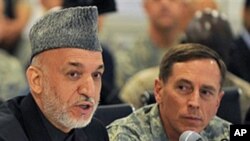The public differences between Afghan President Hamid Karzai and the U.S. and NATO commander in Afghanistan, General David Petraeus, over the Afghan war strategy comes from their different roles and perspectives on the conflict, the Pentagon said Monday, adding that they will continued to work throught them.
Their disagreements have simmered for months.
President Karzai wants private security companies to leave his country almost immediately. But General Petraeus says they are necessary for some additional period.
President Karzai wants an end to military raids on the homes of suspected Afghan insurgents. General Petraeus considers the raids an essential part of his counterterrorism effort.
President Karzai told The Washington Post newspaper, over the weekend that he wants a reduction in the number of U.S. troops in Afghanistan, and that he wants the remaining troops to stay on their bases as much as possible. General Petraeus says any drawdown will be based on security conditions and the capabilities of Afghan security forces, and that at the moment, they do not allow for a reduction. On the pace of military operations, Petraeus frequently notes that it is only during the last few months that he has had enough forces to conduct the level of operations he believes is necessary to defeat the insurgency.
In a separate article published in The Post Monday, U.S. officials are quoting as saying that General Petraeus expressed "astonishment and disappointment" at President Karzai's most recent remarks, and that the president's attitude could make the general's position "untenable."
But a Pentagon spokesman U.S. Marine Corps Colonel David Lapan indicated Monday that he sees the disagreements as understandable.
"General Petraeus has a perspective based on his mission," he said. "And President Karzai has a perspective based on his role as the leader of Afghanistan."
Lapan said that senior Pentagon officials want the general and the Afghan president to work out their differences in Kabul.
"This is something that the leadership in Kabul, NATO, General Petraeus and the Karzai government will sort out. Some of the concerns expressed by President Karzai are not unknown to us. They are things that we have heard in the past. So they continue to work through those," said Lapan.
President Karzai will have a chance to make his case directly to President Barack Obama and other coalition leaders at the NATO summit in Lisbon this week. And although he might find sympathy for his goals, he may not find much support for his calls for major and immediate changes in allied operations.
For example, U.S. Secretary of State Hillary Clinton said Monday that "intelligence-driven, precision-targeted operations against high-value insurgents and their networks is a key component" of allied military operations.
"We believe that these operations are in the best interest of the Afghan people, the Afghan government and the ISAF troops who are working with their Afghan counterparts to secure the country," she said.
Clinton also said Afghan forces participate in the operations and that "they are having a significant impact on the insurgent leadership and the networks that they operate." She said U.S. leaders share many of President Karzai's concerns and goals, and that NATO has modified some of its tactics to ease Afghan concerns. But she said that any major changes, like a troop reduction or decreased operations, will be based only on security conditions and the capabilities of the Afghan forces.
Many of the leaders who will attend the NATO summit, including President Obama, would be only too happy to reduce their troop levels in Afghanistan, along with their operating tempo and casualties. And Mr. Obama has said the process will begin next July. But he and other leaders have expressed concern that moving too quickly would erase the gains that this year's troop increase has helped achieve.
It is a fine line for all of the leaders to walk, particularly with strong opposition to the war among many Europeans and President Karzai's statement that the Afghan people want the foreign troops out, too.











